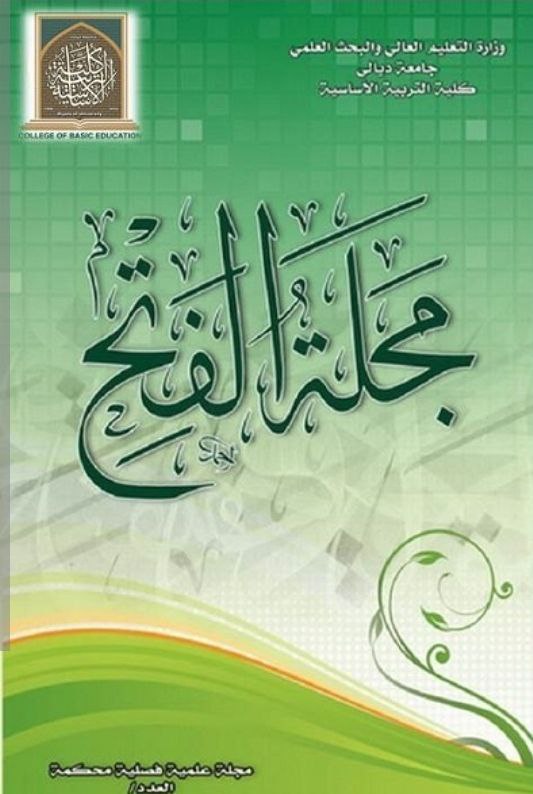The Effect of Psychological Engineering on Developing Emotional Intelligence of Students Institute of Fine Arts
DOI:
https://doi.org/10.23813/fa/16/42Keywords:
Psychological Engineering , Emotional IntelligenceAbstract
Abstract :
This study acquires its importance from the fact that it deals with Emotional intelligence, the present study aims at finding out:
The Effect of psychological engineering on Developing Emotional Intelligence of Students Institute of Fine Arts via testing the following hypotheses:-
1-There are no statistically significant differences on the level of (0,05)P between the Scores of the experimental group scares before and after programmer.
2- There are no statistically significant differences on the level of (0,05)P between the Scores of the experimental and control groups in the post test.
3- There are no statistically significant differences on the level of (0,05)P between the Scores of the experimental group in the post and postponed test.
For achieving the aims of this study, two tools have been used: (Al Aqaishy,2003)measure for Emotional intelligence and the program that has been prepared according to the psychological engineering .
Moreover the experimental approach is adopted to verify the study hypotheses. The sample consists of (30) male students who got less score on the Emotional intelligence measure. The sample is selected from students in the Institute of Fine Arts in the city of Baqubah. They are distributed randomly into two equal groups. The set program was applied on the experimental group while the control group is not exposed to training program Then, the psychological engineering approach was adopted . Furthermore ; the number of program session was (12). The validity of the program is achieved through exposing it to a number of experts.
In order to process data of the study, a group of statistical tools were used like; Pearson Correlation Coefficient, Kolmogorov-Smirnov test and Wilcoxen test.
It has been found out that
1-There are statistically significant differences at 0.05 level of significance in experimental group and in favor of the program
2-There are statistically significant differences at 0.05 level of significance between the experimental and control groups . in the post test and in favor of the experimental group
3-There are no statistically significant differences at 0.05 level of significance between the scores of the experimental group students in the post and postponed test.
References
المصادر :
* الأحمدي, محمد عليثة (2007م): الذكاء الوجداني وعلاقته بالذكاء المعرفي والتحصيل الدراسي لدى عينة من طلاب جامعة طيبة بالمدينة المنورة. مجلة العلوم الاجتماعية. مج (35), ع (4).
* البياتي, عبد الجبار توفيق واثناسيوس زكريا(1977): الإحصاء الوصفي والاستدلالي في التربية وعلم نفس ,دار الكتب للطباعة والنشر, جامعة البصرة.
* التكريتي، محمد عبد الكريم(2001): آفاق بلا حدود، الطبعة الخامسة ، الملتقى، دمشق، سوريا.
* توفيق, عبد الجبار(1985):التحليل الإحصائي في البحوث التربوية و النفسية و الاجتماعية – الطرق اللا معلمية, ط2,مؤسسة الكويت للتقدم العلمي, الكويت.
* خوالدة ، محمد عبد الله محمد (2004) : الذكاء العاطفي الذكاء الانفعالي ، ط1 ، دار الشروق للنشر والتوزيع ، عمان – الأردن 0
* رزق الله, رندا(2005): برنامج تدريبي لتنمية مهارات الذكاء العاطفي لدى تلاميذ الصف السادس دراسة تجريبية ميدانية في مدارس مدينة دمشق –سوريا , أطروحة دكتوراه غير منشورة, جامعة دمشق.
* الظاهر ,زكريا محمود (1999):مبادئ القياس و التقويم في التربية, مكتبة دار الثقافة للنشر و التوزيع, عمان ,الأردن.
* عبد الرزاق, محمود شاكر(2009): أثر أسلوبين إرشاديين ( الهندسة النفسية والتقويم الذاتي) في تنمية الذكاء الأخلاقي لدى تلاميذ المرحلة الابتدائية, أطروحة دكتوراه غير منشورة ,كلية التربية /الجامعة المستنصرية.
* العطافي، حسن عبد الله(2007): أثر الأسلوب المعرفي البرمجة اللغوية العصبية في تنمية مفهوم الذات لدى طلاب المرحلة المتوسطة، رسالة ماجستير (غير منشورة)، كلية التربية، جامعة ديالى.
* العكايشي ، بشرى أحمد جاسم (2003) : التوافق في البيئة الجامعية وعلاقتها بقلق المستقبل ، إطروحة دكتوراه غير منشورة، الجامعة المستنصرية ، كلية التربية
* عودة, احمد و خليل الخليلي(2000):الإحصاء للباحث في التربية و العلوم الإنسانية,ط2,عمان,الأردن,دار الفكر للنشر و التوزيع.
* الفقي ، إبراهيم (1999): المفاتيح العشرة للنجاح، دار منار للطباعة ، دمشق، سوريا.
*ـــــــ (2000): قوة التحكم بالذات، دار منار للطباعة ، دمشق، سوريا.
*ـــــــ ، إبراهيم(2001): البرمجة اللغوية العصبية وفن الاتصال الا محدود ، المركز الكندي للبرمجة اللغوية العصبية، كندا.
* فيركسون , جورج ,أي (1991) : التحليل الاحصائي في التربيه وعلم النفس , ترجمة هناء محسن العكيلي , بغداد , العراق : دار الحكمه 0
* ماكد برموت، أيان، ووندي، جابو (2004): مدرب البرمجة اللغوية العصبية، الطبعة الأولى، مكتبة جرير، المملكة العربية السعودية.
*Adams, C.S (1964 ): Measurement and Evaluation in education Psychology and Guidance . Ranhart ,Winston , New York.
- *Bandler, R, R(1979): frogs in to princes Real pcople press/Eden Grove Editioins. www.reefent,gov.sx www.Nlp.com www.heferd.com
*Barron ,A.(1981):Psychology .Halt-Saunders ,International edition ,Japan
*Bar – On , R. (1997): Emotional Quotient Inventory: Measure of Emotional Quotient Inventory. Toronto, Ontario: Mutti-Health Systems
*Ebel, R.L. ( 1972 ) : Essential of Education Measurement , US.A ,New York
*Fonagy ,P. & Higgit ,A.(1984 ) :Personality Theory and clinical practice , Methuen ,London.
*Goleman, D. (1995): "Emotional Intelligence: Why it can matter more than I.Q." . New York: Bantam Books.
*Goleman, D. (1997): "Emotional Intelligence". New York: Washington Press.
* *Salovey, P. & Mayer, j. (1990): Emotional Intelligence imagination. Cognition and Personality, Vol. 9, pp. 185-211
Downloads
Published
How to Cite
Issue
Section
License
Copyright (c) 2016 مجلة الفتح

This work is licensed under a Creative Commons Attribution 4.0 International License.
حقوق النشر والترخيص
تطبق مجلة الفتح للبحوث التربوية والنفسية ترخيص CC BY (ترخيص Creative Commons Attribution 4.0 International). يسمح هذا الترخيص للمؤلفين بالاحتفاظ بملكية حقوق الطبع والنشر لأوراقهم. لكن هذا الترخيص يسمح لأي مستخدم بتنزيل المقالة وطباعتها واستخراجها وإعادة استخدامها وأرشفتها وتوزيعها ، طالما تم منح الائتمان المناسب للمؤلفين ومصدر العمل. يضمن الترخيص أن المقالة ستكون متاحة على نطاق واسع بقدر الإمكان وأن المقالة يمكن تضمينها في أي أرشيف علمي.
لمزيد من المعلومات، يرجى متابعة الرابط: https://creativecommons.org/licenses/by/4.0/.



